India has some of the world’s most scenic and diverse national parks, from the Hemis and Valley of Flowers in the north to the Namdapha in the East, Ranthambore and Gir in the west to the Periyar in the south. These national parks in India safeguard the natural habitats of land and marine animals from human encroachment. India has the third highest number of National Parks (106) in the world, and many of these parks are UNESCO World Heritage sites.
Whether you’re a bird watcher, wildlife or nature photographer, artist, mountaineer, outdoor enthusiast or just want to relax and rejuvenate amidst nature away from your daily routine, India’s national parks have something for you. Many parks have excellent accessibility, well-laid out government-approved itineraries for safaris or trekking, good accommodation facilities nearby and loads of fresh air with amazing views.
India is blessed with different types of terrains. Whether it is lush green forests with secret lakes, hilly jungles with centuries-old forts, snow-capped mountains that are the tallest in the world, azure beaches laced with beautiful corals or golden sands of the great deserts – you can find all these in India. Each environment comes with mesmerising views and unique flora and fauna, some of which you probably wouldn’t find anywhere else on Earth. So, pack your bags and get ready to look for snow leopards, one-horned rhinos, Asiatic lions, Royal Bengal tigers, Lion-tailed macaques, Red Pandas and multi-coloured corals. Here are the 20 Best National Parks in India for your travel list.
Also read:
- 22 Palaces In India
- 28 Landmarks In India
- 22 Things To Do In Mumbai
- 20 Things To Do In Chennai
- Langar Etiquette
- Exploring Ajanta and Ellora Caves
- Ranthambore National Park Safari
- Kerala Kaleidoscope
- Kerala Backwaters
- 20 Things To Do In Hyderabad
- 20 Beaches In India
- Best Time To Visit India
- 20 National Parks In India
- 20 Smart Cities In India
- 20 Things To Do At Night In Delhi
- 15 Places To Visit In South India
- 10 Places To Visit In Delhi
- 10 Places To Visit In Kolkata
- 7 Places To Visit In India
- Brahmaputra River Cruise
- Ganges River Cruise
- Places To Visit In Jaipur
- Places To Visit In Udaipur
- Places To Visit In Jodhpur
- How Many Tigers Are Left In The World?
- 20 Drinks In India To Try
- Indian Street Food Guide
- A Guide To Mountains In India
- 20 Things To Do In Mumbai At Night
- Indian Christmas Travel
Contents
- 20 Best National Parks In India
- 1- Bandipur National Park, Karnataka
- 2- Valley of Flowers National Park, Uttarakhand
- 3- Kaziranga National Park, Assam
- 4- Sundarbans National Park, West Bengal
- 5- Jim Corbett National Park, Uttarakhand
- 6- Keoladeo Ghana National Park, Rajasthan
- 7- Mahatma Gandhi Marine National Park, Andaman and Nicobar Islands
- 8- Namdapha National Park, Arunachal Pradesh
- 9- Khangchendzonga National Park, Sikkim
- 10- Manas National Park, Assam
- 11- Great Himalayan National Park, Himachal Pradesh
- 12- Periyar National Park, Kerala
- 13- Hemis National Park, Ladakh
- 14- Kanha National Park, Madhya Pradesh
- 15- Bandhavgarh National Park, Madhya Pradesh
- 16- Gir Forest National Park, Gujarat
- 17- Eravikulam National Park, Kerala
- 18- Nagarahole National Park, Karnataka
- 19- Satpura National Park, Madhya Pradesh
- 20- Ranthambore National Park, Rajasthan
20 Best National Parks In India
1- Bandipur National Park, Karnataka

Bandipur National Park in South India was once a royal hunting ground for the Maharajas.
The park is well-known for its significant tiger habitat and houses the endangered Asiatic wild elephant.
Bandipur is one of the most popular and well-organised parks in India and has been consistently rated one of the best parks in India.
Bandipur is suitable for families as it has a lot of quality accommodation options close to it.
Jungle safaris and overnight camping in a nature camp or jungle lodges are some popular activities in the park.
How’s the terrain? Hilly. Deciduous Forests
Why go? Family Friendly. India’s Largest Tiger Habitats
Government website: Karnataka Tourism
2- Valley of Flowers National Park, Uttarakhand
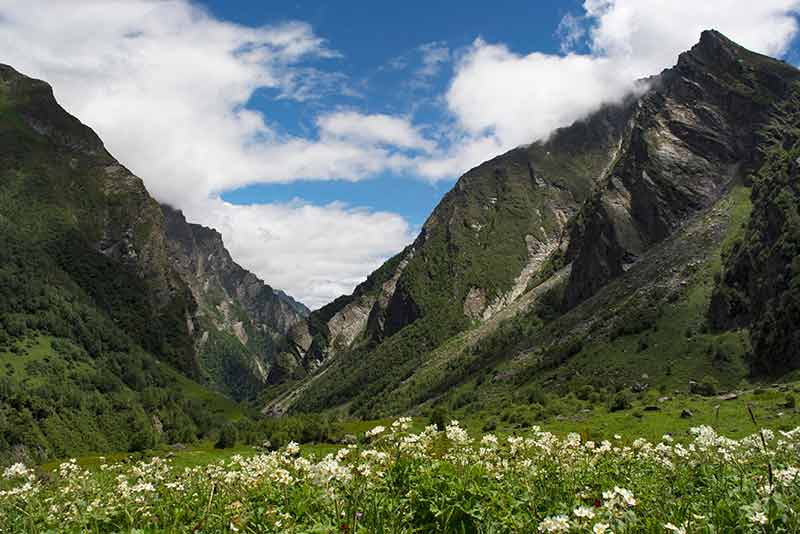
This park is a valley surrounded by snow-capped Himalayan peaks.
Known for the meadows of alpine flowers (like the Bramha Kamal, which only blooms for a few hours after sunset), the valley is also home to exotic flora and fauna.
The valley comes alive during the monsoon season with a carpet of colourful flowers against the backdrop of snow-capped peaks.
The snow leopard, red fox, blue sheep, and Himalayan monal are some unique wildlife you might encounter.
The Valley of Flowers Park has something for everyone.
Although getting to the park requires a slight trek, very few national parks can rival its mesmerising views, and your trip will be well worth it!
How’s the terrain? Valley amidst rugged peaks
Why go? The scenery of colourful flowers amidst the snow-capped mountains of the Himalayas.
Government website: Uttarakhand Tourism
3- Kaziranga National Park, Assam
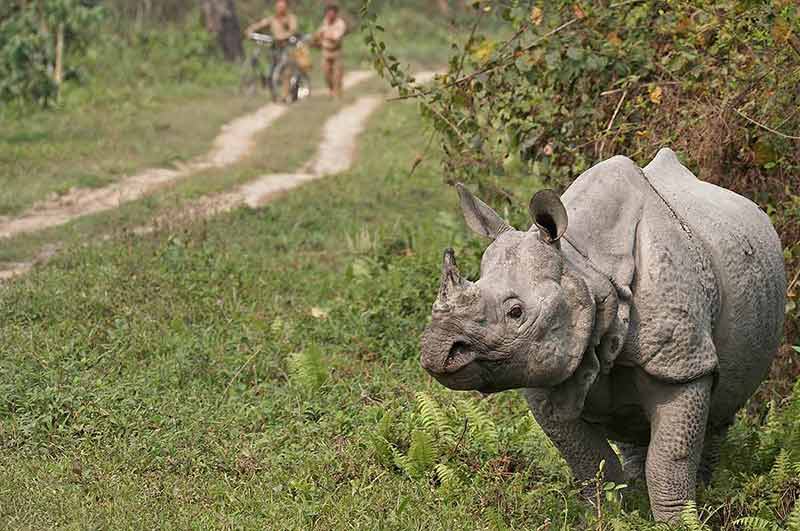
Kaziranga National Park in Assam in North Eastern India is on the banks of the mighty river Brahmaputra.
The park is part of the Eastern Himalayan biodiversity hotspot and one of India’s best examples of successful wildlife conservation.
It has the highest population of great one-horned rhinoceros in the world; hence the park is often symbolised using a one-horned rhino.
Also a Tiger Reserve, Kaziranga has large populations of elephants, wild water buffalos, swamp deer and other wildlife.
The park also receives very high levels of rainfall during the monsoon season, and more than two-thirds of the park remains submerged due to the rising water levels in the Brahmaputra.
How’s the terrain? Flood plains of river Brahmaputra. Tall elephant grass and dense forests, marshlands and sandbars.
Why go? Great one-horned rhinoceros. Wildlife safaris. Elephant rides.
4- Sundarbans National Park, West Bengal
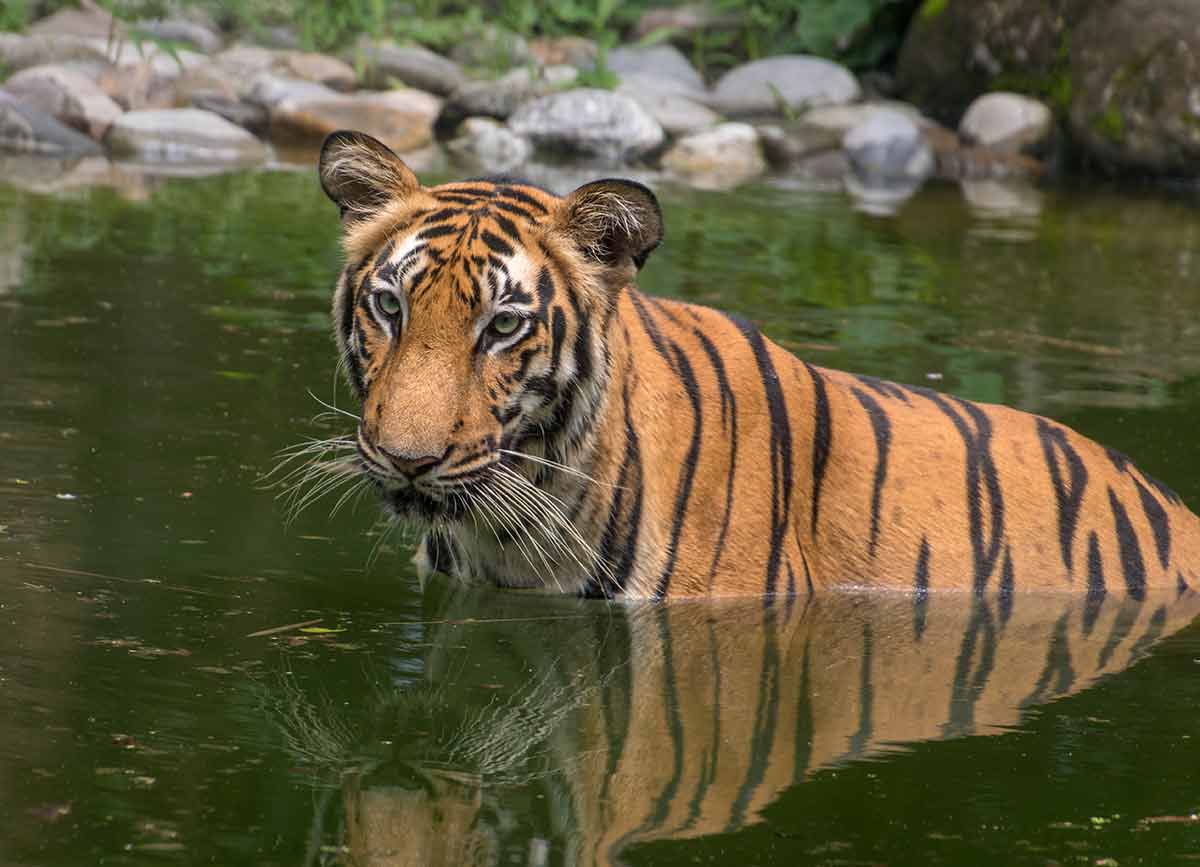
Just a few hours’ drive from Kolkata, the Sundarbans is part of the Ganges delta and home to the largest mangrove forest network in the world, part of which extends to Bangladesh.
The park is a haven for many land and aquatic animals and a winter destination for migratory birds.
Travellers flock to the Sundarbans to tour the dense mangrove forests and peek at many of the land and sea animals, birds and reptiles.
Wildlife safaris allow you to see a large variety of animals and birds and transport you into surreal locations that make for very memorable experiences.
Sundarbans is very popular among professional wildlife photographers across the world.
How’s the terrain? Marshy mangrove forests, mudflats, seven rivers and many watercourses.
Why go? Royal Bengal tiger, mangrove forests and wildlife photography
Government website: West Bengal Tourism
5- Jim Corbett National Park, Uttarakhand
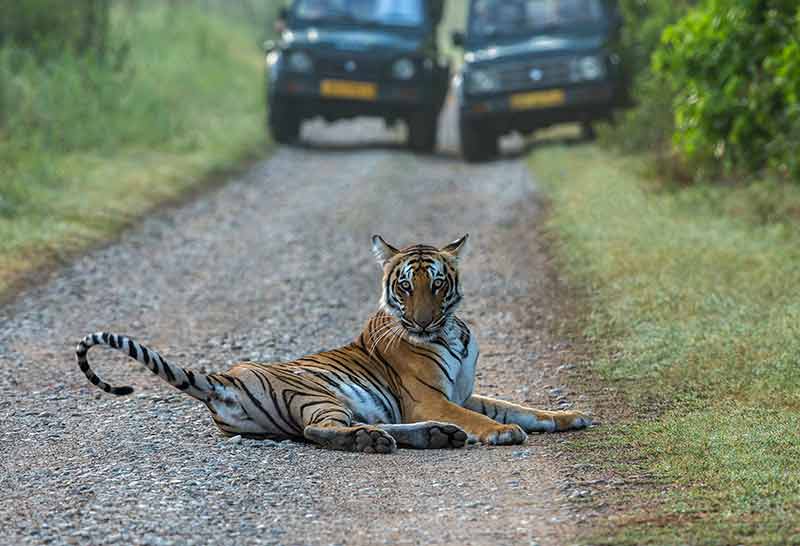
Corbett National Park, the oldest National Park in India, created before India’s Independence, is in the foothills of the Himalayas.
The park is a few hours’ drive from New Delhi and is known for tiger spotting and bird watching.
There are government-monitored jeep safaris (a limited number of jeeps allowed every day) that allow you to tour the forest’s terrains and accommodation options to stay inside the park for the night.
Various tourism activities are allowed inside the park, such as river rafting and rock climbing, and all the tours are conducted in an eco-friendly manner.
How’s the terrain? Dense deciduous forests, rolling hills and ridges, grasslands, swamps and marshes.
Why go? Jungle safaris, river rafting, rock climbing and bird watching.
Government website: Uttarakhand Tourism
6- Keoladeo Ghana National Park, Rajasthan

For bird watching and photography, Keoladeo is the perfect park for you.
This park is renowned as one of the world’s most popular bird feeding and breeding grounds and is the winter home for the endangered Siberian Crane.
The park is flocked by scores of ornithologists during the hibernal season when many birds migrate to this region.
Just a couple of hours’ journey from Agra, this park is part of the golden tourism triangle of Delhi-Jaipur-Agra.
How’s the terrain? Mostly plains, grassland, woodlands and wetlands.
Why go? Bird watching, family-friendly.
Government website: Rajasthan Tourism
7- Mahatma Gandhi Marine National Park, Andaman and Nicobar Islands
Mahatma Gandhi Marine National Park is in the Andaman Islands and is an hour’s drive from Port Blair, the island’s capital city.
Andamans are famous not only for their azure waters and white sandy beaches but also for the Marine National Park, which serves as a protected area for beautiful coral reefs and nesting sea turtles.
Government-supervised tour operators conduct reef excursions daily, allowing you to look closely at the coral reef habitat in its natural form.
How’s the terrain? Island archipelago with underwater coral reef.
Why go? Coral reef, nesting sea turtles and beaches.
8- Namdapha National Park, Arunachal Pradesh
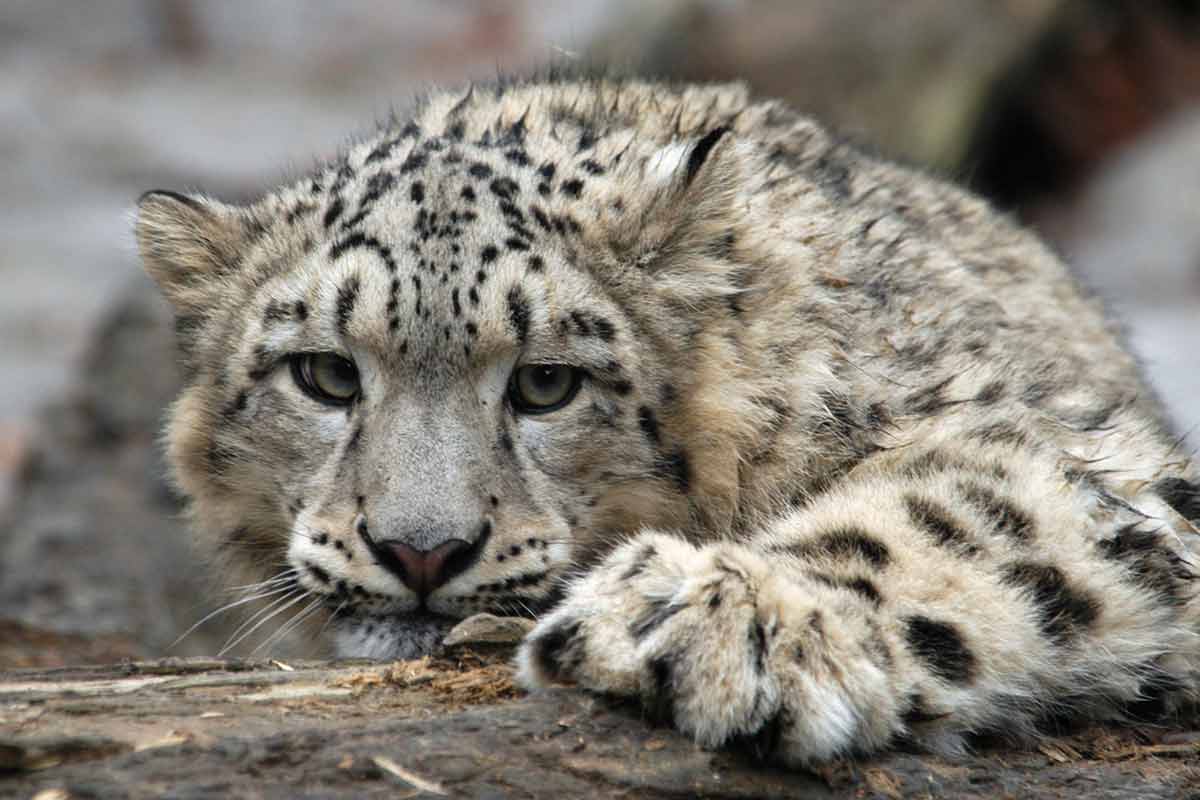
Namdapha is one of India’s largest national parks and one of the country’s most bio-diverse parks.
The park’s altitude varies from 200 to 4500 m, making some parts of the park snow-clad for most of the year.
The varied landscape creates different habitats and ecosystems in which different types of flora and fauna thrive.
The Noa-Dohing river that flows through the park is a major tributary of the Brahmaputra and contains a wide variety of aquatic life.
Many species of butterflies thrive in the park.
Many wildlife tours are organised in the park where you can catch a glimpse of the red panda, snow leopard or the Himalayan black bear along with bird watching.
How’s the terrain? Mountainous evergreen forests
Why go? Rich variety of flora, fauna and aquatic life. Varied landscapes.
Government website: Arunachal Pradesh Tourism
9- Khangchendzonga National Park, Sikkim
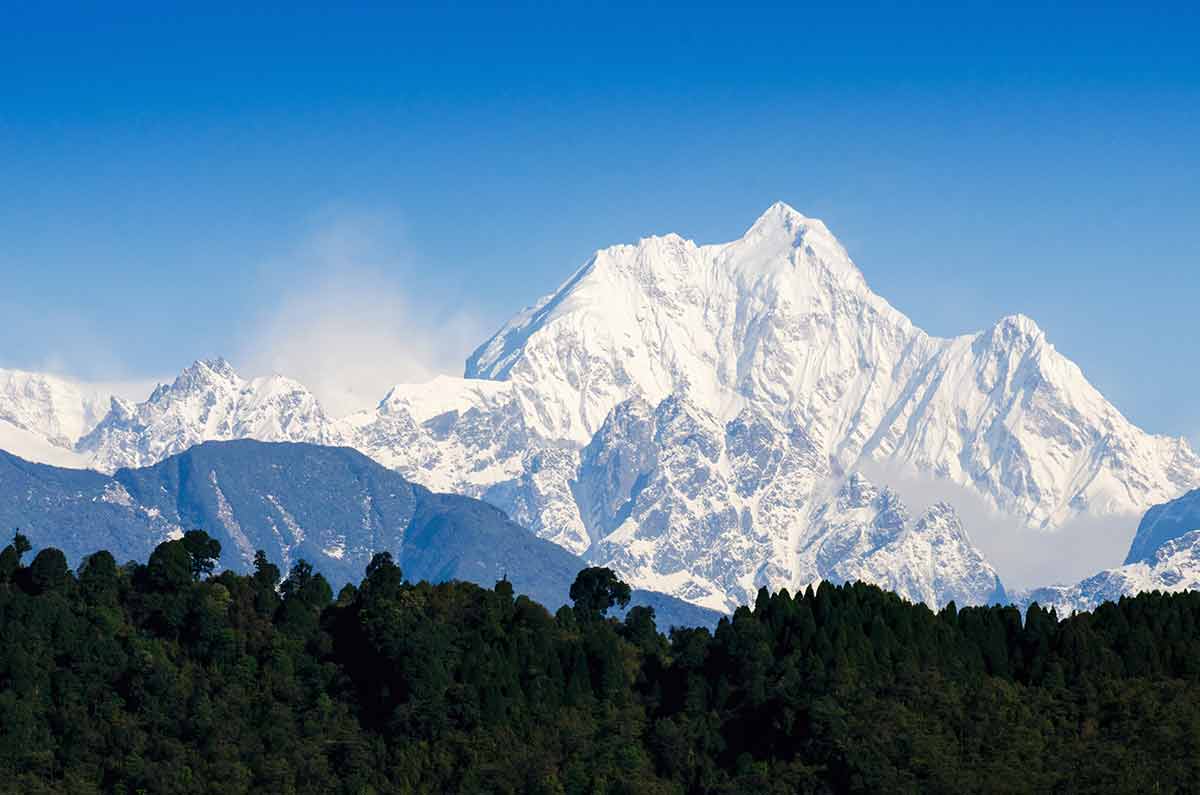
Khangchendzonga (or Kanchenjunga) National Park is India’s first mixed heritage site, meaning this region has both natural and cultural significance.
The park in Sikkim gets its name from the Kanchenjunga Peak, the third-highest mountain peak in the world.
Being a high-altitude national park, Kanchenjunga is very popular for trekking and camping activities.
With altitudes ranging from 1829 meters to over 8550 m, the park has a diverse range of terrains, from misty snow-capped mountain tops with dense vegetation to glacial valleys.
There are many trekking routes inside the park, and international tourists are required restricted area permits to access many park regions.
How’s the terrain? Mountainous with dense vegetation in the lower elevations that gradually thins as elevation rises. Glacial valleys.
Why go? Breathtaking views, trekking and camping. Rare high-altitude wildlife in the Himalayas.
Government website: Sikkim Tourism
10- Manas National Park, Assam
Manas National Park is in the foothills of the Himalayas in Assam and is contiguous with the Buxa Tiger Reserve in West Bengal and Royal Manas National Park in the neighbouring country of Bhutan.
Manas and Buxa serve as the international corridor for elephant migration between India and Bhutan.
It’s home to more than 20 endangered and rare wildlife species, including the Golden Langur.
Manas is a famous tiger reserve, elephant reserve and world heritage site and is renowned for its biodiversity.
The Beki River flows through the park, which makes the park’s terrain a combination of alluvial grasslands and dense forests.
The park has wildlife safaris, elephant safaris, activities such as river rafting, along with tours of tea plantations.
How’s the terrain? Hilly with grasslands and dense forests.
Why go? Wildlife and elephant safaris, river rafting and trekking.
11- Great Himalayan National Park, Himachal Pradesh
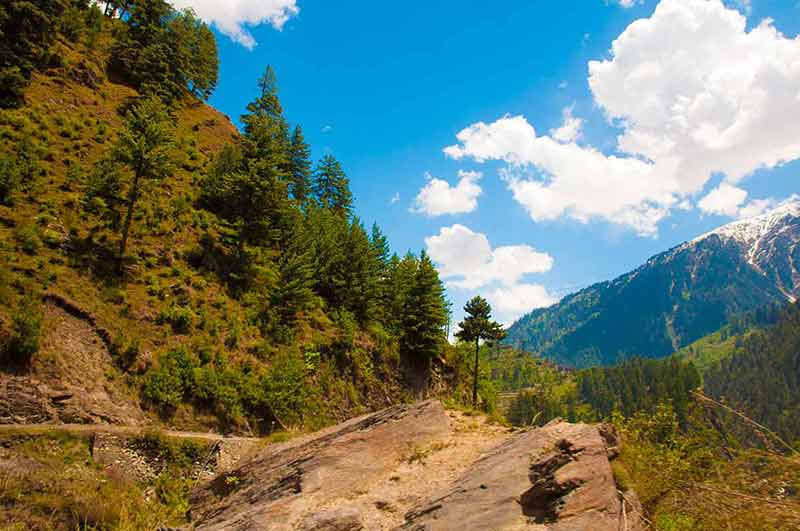
Great Himalayan National Park is a high-altitude national park and one of India’s most popular trekking and camping destinations.
The park is famous for its breathtaking scenery, from snow-capped mountains to glacial valleys and high ridges to deep gorges filled with dense forest covers and waterfalls.
The park’s terrain has varying altitudes from 1500 m to over 6000 m and is home to flora and fauna endemic to each altitude.
Well-organised treks with difficulty ranging from a relatively easy one- or two-day trek to challenging multi-day treks are sought after in the park.
International tourists require a permit to enter the park.
How’s the terrain? Mountainous with dense vegetation in the lower elevations, gradually thinning, and glacial valleys.
Why go? Well-organised treks and breathtaking views.
Government website: Himachal Pradesh Tourism
12- Periyar National Park, Kerala
Periyar is a Tiger and Elephant Reserve in South India, with two major rivers (Periyar and Pamba) flowing through it.
These rivers combine with the constant monsoon rainfall to create a lush green jungle canopy dotted with hills and lakes.
You can participate in eco-tourism activities, including jungle safaris, boating and bamboo rafting, trekking, camping, and tea plantations.
Staying overnight underneath the clear starry sky on the camping grounds amidst thick forest covers flanked by a river on one side will be a memory you can cherish for a long time.
How’s the terrain? Hilly with tropical evergreen and moist deciduous forest and grasslands.
Why go? Jungle safaris, camping, trekking, bamboo rafting, tea and coffee plantations.
Government website: Kerala Tourism
13- Hemis National Park, Ladakh
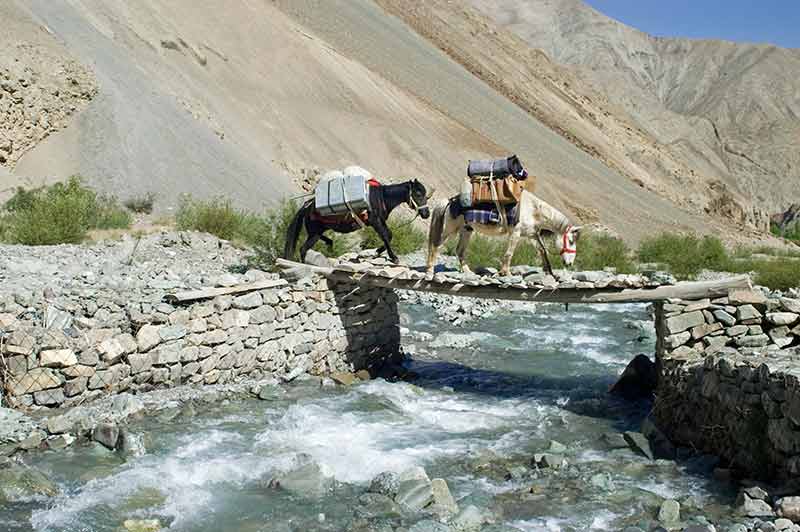
Hemis is a high-altitude park and the largest national park in South Asia.
The park’s elevation ranges from 3000 m to over 6000 m, and the region receives little rainfall resulting in sparse vegetation, which diminishes at even higher altitudes.
The park is famous for many wildlife that can survive at high altitudes, such as snow leopards, Tibetan fox, Asiatic ibex, Blue sheep, Tibetan sheep and the endangered Eurasian brown bear.
Homestays are popular in the park, giving visitors a glimpse of living sustainably amidst its harsh environment.
Trekking is very popular in the park, but permits are necessary for International visitors.
How’s the terrain? Mountainous with low vegetation at high altitudes. Glacial valleys and streams.
Why go? Trekking, rugged landscape, snow leopards, Himalayas.
Government website: Ladakh Tourism
14- Kanha National Park, Madhya Pradesh
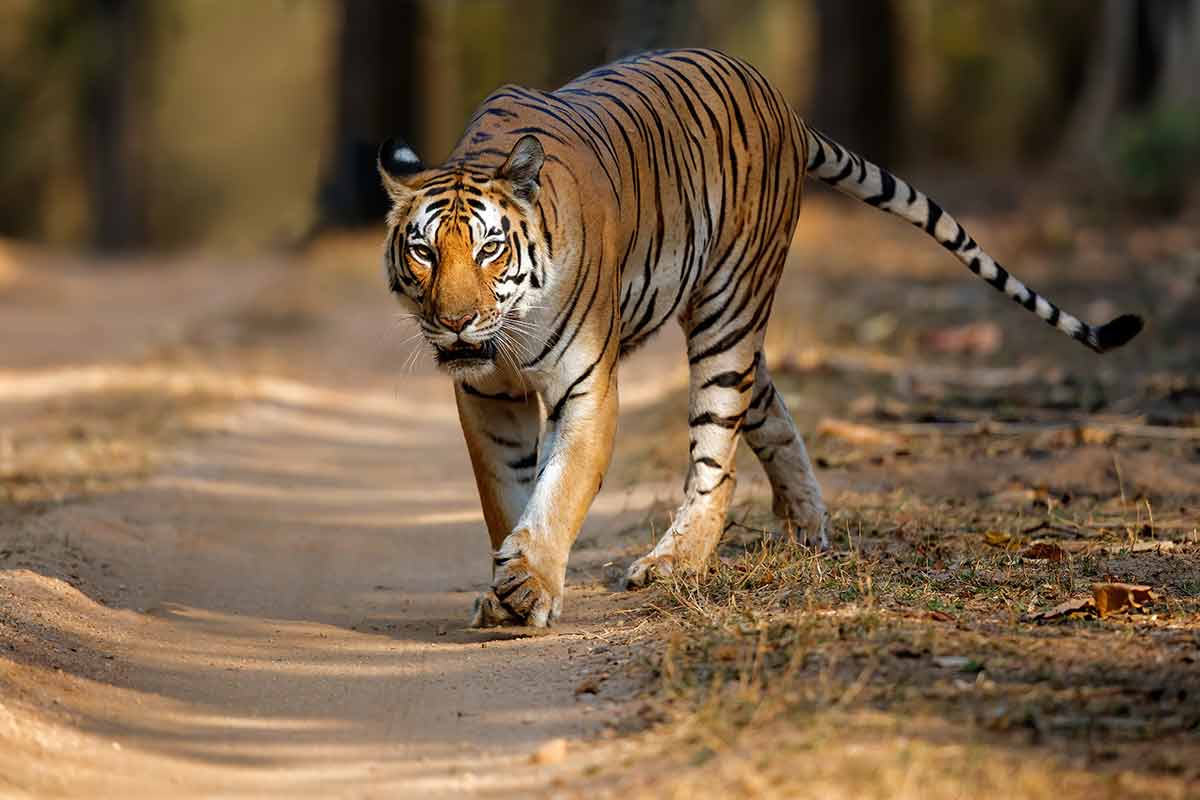
Kanha is one of India’s largest Tiger Reserves and is renowned for its conservation programmes for endangered species such as the Barasingha.
The park is separated into two protected areas, and each area has different safari tours organised every day.
Going on a jungle safari among the towering evergreen Sal forests is an experience.
The Jungle Book, written by Rudyard Kipling, is popularly known to be based on the Kanha National Park in India.
How’s the terrain? Evergreen Sal Forests. Grasslands. Rivers.
Why go? Well-maintained Park. Wildlife Safaris.
Government website: Madhya Pradesh Tourism
15- Bandhavgarh National Park, Madhya Pradesh
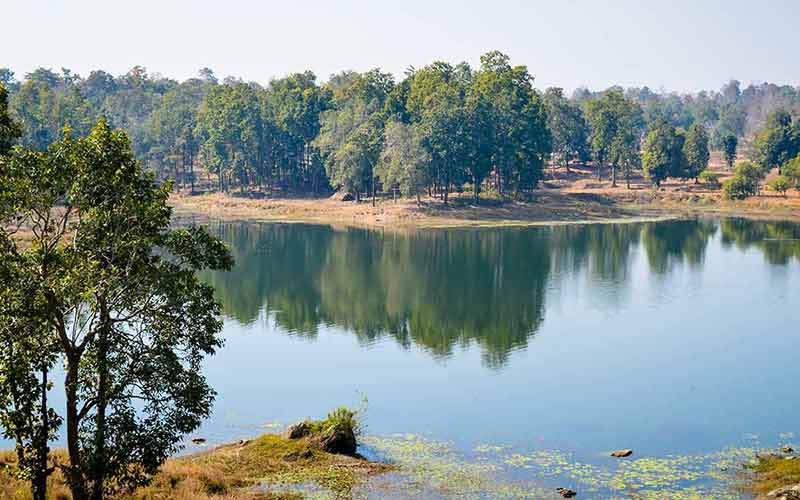
If you want to see a Bengal tiger, your best bet would be to go to Bandhavgarh National Park.
This park has the world’s highest density of Bengal tigers.
Jungle safaris are very popular in the park, and there are three types of safaris offered here – jeep, canter and elephant.
The Bandhavgarh Fort is an old ruined fort situated at the top of a nearby 800-m cliff and is a popular destination for trekking.
The park also features other attractions such as the three-cave point and the Baghel museum, which displays belongings of erstwhile Maharajas, and has a stuffed body of the first white tiger captured in the world.
How’s the terrain? Evergreen Sal forest and mixed forest, hills, rivers, marshes and meadows.
Why go? Tiger spotting and jungle safaris.
16- Gir Forest National Park, Gujarat
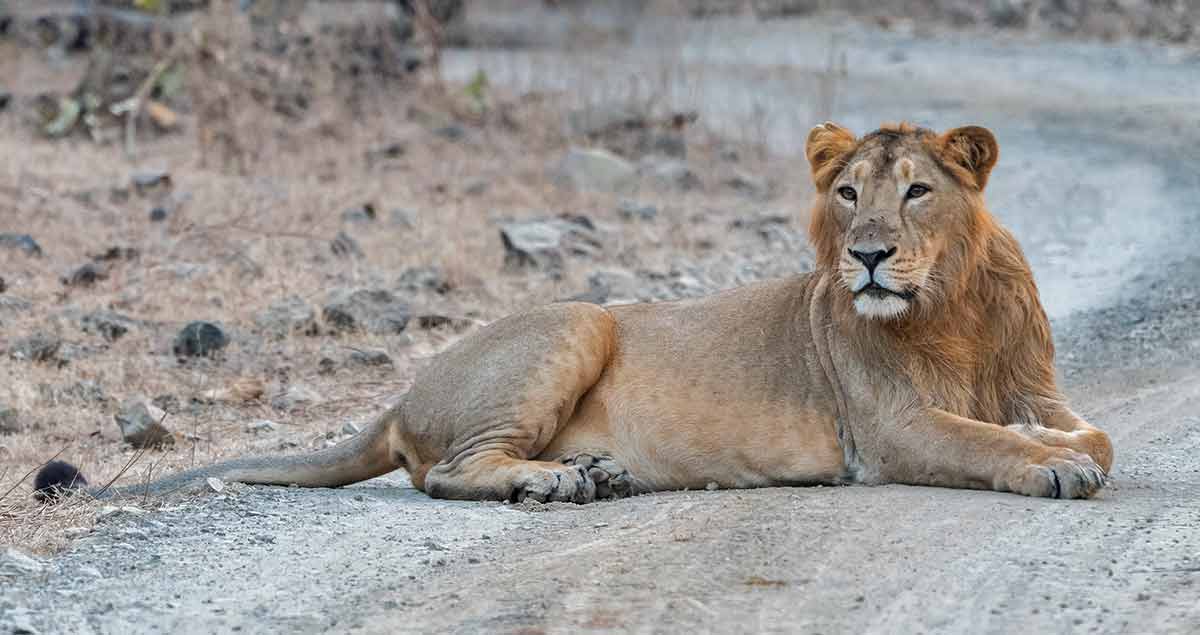
This hilly forested park was a Royal hunting ground of the erstwhile Nawabs and the colonial British and is now the last refuge of the Asiatic Lions.
The park faces challenges to its ecosystem due to droughts, forest fires and cyclones, but conservation efforts by the government have softened the impact of these challenges.
Eco-tourism is a popular way to experience the park’s natural beauty while conserving its ecosystem.
The government’s conservation efforts, along with wildlife activists and NGOs, are the primary reason for Gir National Park’s preservation.
International tourists require a permit for the jungle safari.
How’s the terrain? Hilly and dry deciduous forests
Why go? Wildlife safaris and Asiatic lions.
Government website: Gujarat Tourism
17- Eravikulam National Park, Kerala

Eravikulam is the most scenic national park in India and is home to various wildlife such as elephants and the endangered Nilgiri Thar.
The park offers scenic trekking trails, elephant safaris, and camping spots between the thick forests and rolling hills.
It’s also home to the Neelakurinji flower, which blooms once every 12 years and paints the hillside blue (neela in the local language) with its colour.
The next sighting of this flower is expected in 2030.
The Nilgiris derive their name from this flower.
The park’s proximity to Munnar, a popular hill station in Kerala, makes it a very sought-after destination.
.
How’s the terrain? Hilly high-altitude grasslands and sholas.
Why go? Scenic beauty, shola grasslands, camping and trekking.
Government website: Kerala Tourism
18- Nagarahole National Park, Karnataka
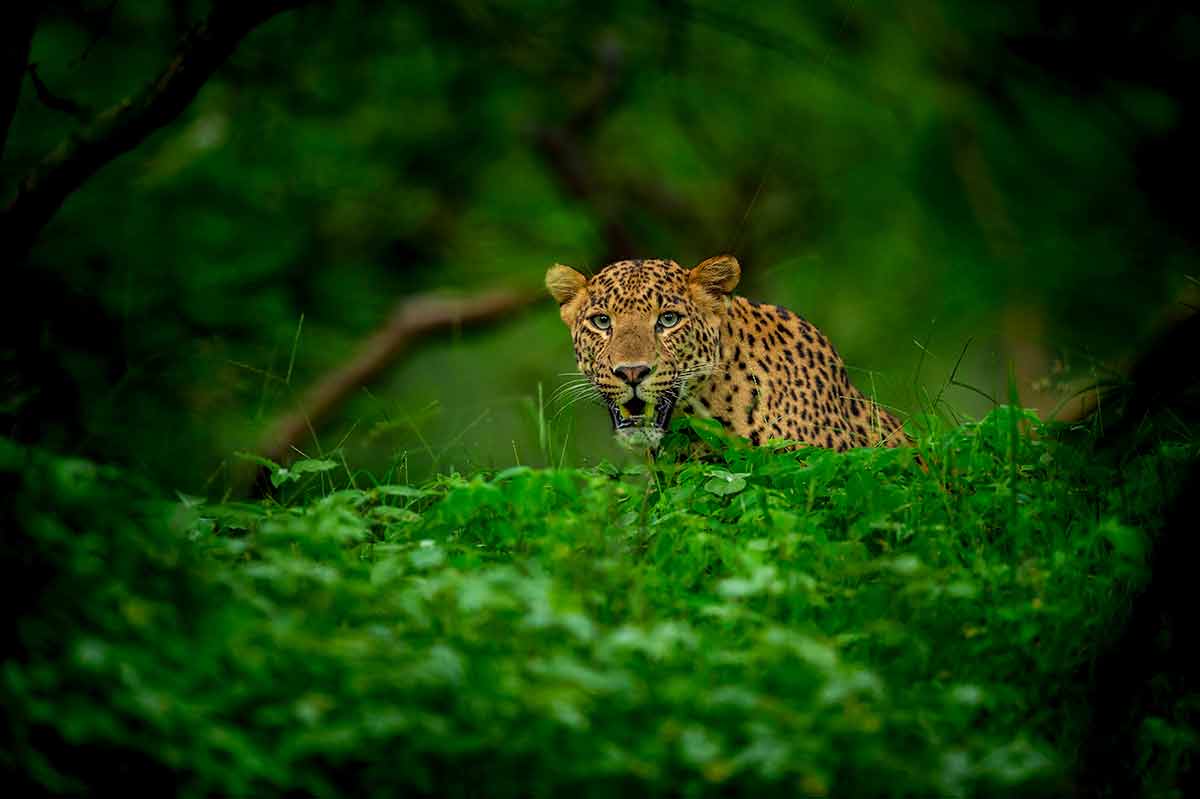
If you want to break away from routine and get closer to nature, look no further than Nagarahole National Park.
The park has a rich forest cover, hills, watercourses, waterfalls and wildlife that includes tigers, elephants, leopards and others.
It’s part of Nilgiri Biosphere Reserve in South India, the largest protected forest area in India.
There are many lodges close to the park which provide luxury accommodation.
The park has two types of safaris – jeep safari on land and boat safari on the Kabini river.
Boat safari should be on your must-do list as the experience of floating on a river boat and watching animals in their natural habitat is a fulfilling experience.
How’s the terrain? Rich forest cover, hills, watercourses and waterfalls
Why go? Bengal Tigers and Kabini boat safaris.
Government website: Karnataka Tourism
19- Satpura National Park, Madhya Pradesh
Satpura national park is part of the central Indian highland ecosystem, comprising the Satpura mountains, rivers, gorges and dense forests.
Many endangered and rare species thrive in this ecosystem, and the park also houses hundreds of varieties of flora, some of which are endemic to this region and have medicinal value.
This park is one of the few parks in India which allows tourists to walk and cycle inside the park.
Jeep safari, trekking and canoeing are other popular activities in this park.
How’s the terrain? Rugged, dense forests, sandstone peaks, narrow gorges and ravines.
Why go? Jeep safaris, cycling and canoeing.
20- Ranthambore National Park, Rajasthan
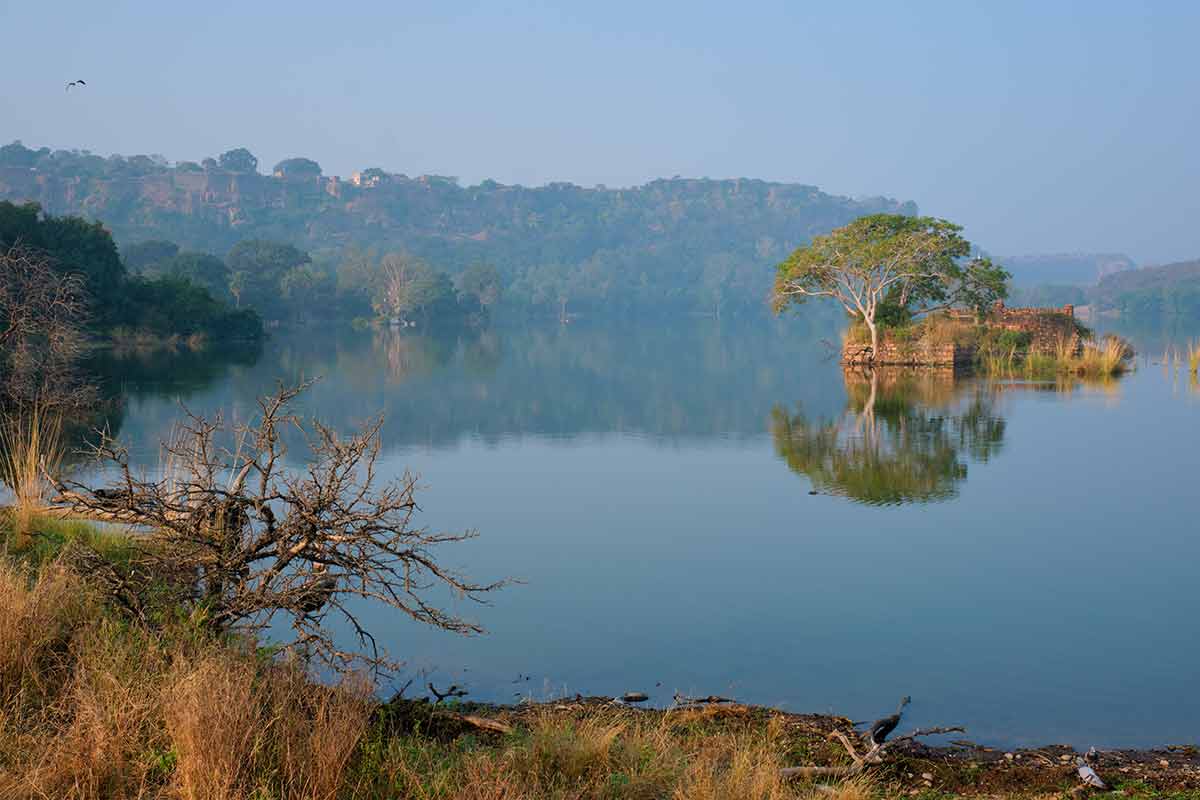
Finally, we end our journey in the Ranthambore National park, renowned for having the most significant number of Bengal tigers in India.
The park is famous for tiger safaris and is a paradise for bird watchers.
It’s located at the junction of the Vindhya and Aravalli mountains, which are geologically one the oldest mountains in the world.
A visit to the park would let you see and experience some of the natural rock formations more than a billion years old.
The park features a 10th-century Fort (Ranthambore Fort) built on a cliff, which makes for a good trek.
Jogi Mahal, a red sandstone building built as a hunting lodge for erstwhile royal families, is a popular tourist spot within the park.
How’s the terrain? Rolling hills, dry deciduous forests, grassy meadows and lakes.
Why go? Tiger and jungle safaris, bird watching.
Government website: Rajasthan Tourism
If you love exploring national parks, you might like to read:
- Wyoming National Parks Guide
- Nevada National Parks Guide
- Michigan National Parks Guide
- 5 Maine National Parks
- New Hampshire National Parks Guide
- 25 National Parks in Canada
- 17 National Parks in Argentina
- Tasmania National Parks
- 20 National Parks in Mexico
- 18 New Mexico National Parks
- 18 National Parks in Massachusetts
- 17 Colorado National Parks
- 4 Indiana National Parks
- 5 Nebraska National Parks
- 30 Virginia National Parks
- 9 New Jersey National Parks
- 8 National Parks in Arkansas
- 8 Alaska National Parks
- 13 Tennessee National Parks
- 6 National Parks in Louisiana
- 5 Illinois National Parks
- 7 National Parks in Oklahoma
- 7 National Parks in South Dakota
- 12 Alabama National Parks
- 5 North Dakota National Parks
- 8 National Parks in West Virginia
- 20 National Parks in Arizona
- 11 National Parks In Florida
- 8 Hawaii National Parks
- 6 National Parks In Idaho
- Texas National Parks Guide
- 9 California National Parks
- 11 National Parks In Georgia
- 7 National Parks In Missouri
- 5 National Parks in Minnesota
- 7 National Parks In Kentucky
- 8 National Parks In Montana
- 15 National Parks In Washington State
- 8 South Carolina National Parks
- 12 North Carolina National Parks
- 4 Wisconsin National Parks
- 20 National Parks In India
- 11 Oregon National Parks
- 5 Connecticut National Parks
- 27 National Parks In New York State
- 4 Iowa National Parks
- Yosemite National Park
- Zion National Park
- 21 National Parks in Pennsylvania
- 9 National Parks in Mississippi
- 5 National Parks in Rhode Island
- 9 National Parks in Taiwan
- 20 East Coast National Parks
- Guide To Winter in Yellowstone National Park
Plan Your Trip

Rent A Car – Find the best car rental rates at Discover Cars. They compare car hire companies to provide you with the best deal right now.

Find A Hotel – If you’re curious about this article and are looking for somewhere to stay, take a look at these amazing hotels.

